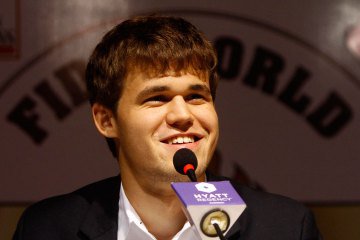

The guard has been changed at the top of the chess world. Last week in Chennai, India, 22-year-old Norwegian prodigy Magnus Carlsen easily toppled defending world champion Viswanathan Anand of India. The challenger won three games without a loss, plus seven draws, ending the match two games before its scheduled length of 12 games.
Carlsen’s domination renders unnecessary any extensive punditry on the match itself. He has been the world’s top-ranked player for two years already while Anand’s results have tailed off, as those of players on the wrong side of forty tend to do. It is true that Anand made quite a few unforced errors in his losses, but as I said before the match, Anand was fighting not only a stronger player but also the tidal forces of time and history. Carlsen is a force of nature whose time has come and there was little Anand could do to slow the inevitable in Chennai.
Carlsen’s greatest chess strength is his remarkable intuitive grasp of simplified positions and his tremendous accuracy in them. I coached Carlsen for a year, in 2009, and I was amazed at how quickly he could correctly evaluate a position “cold,” seemingly without any calculation at all. My own style required tremendous energy and labor at the board, working through deep variations looking for the truth in each position. Carlsen comes from a different world champion lineage, that of Jose Capablanca and Anatoly Karpov, players who sense harmony on the board like virtuoso musicians with perfect pitch.
The win was a great moment for Carlsen, for Norway, and for a chess world eager to embrace the charismatic young champion – who was soon afterward photographed with a huge smile on his face after being tossed into a hotel swimming pool. It was also, of course, a painful blow for Anand and India, a nation that adores its sports heroes and which Anand’s fame turned into a global chess powerhouse. I am one of few people who have been on both sides of this zero-sum equation, but my sympathies were very much with the challenger.
Carlsen has been the heir-apparent since he began collecting accolades such as “the Mozart of Chess” before he was even a teen. His title victory at 22 matches my own record for youngest champion ever. (I’ll point out that I was a few months younger since by the time Carlsen is finished it may be one of the few records I have left!) It is a true generational turnover at the top.
Carlsen is the first world champion to have been brought up entirely in the age of super-strong computer chess. I grew up with boxes of notecards and stacks of dusty books and had to learn to use databases and then chess-playing “engines” as they became strong enough to help, and then to beat, top Grandmasters. Computers have made players of Carlsen’s generation nearly machinelike in their objectivity at the board, so it is a pleasing irony that Carlsen himself is a very intuitive, very “human” player.
The players split a $2.25 million prize fund, a large sum for chess today but far less than you might expect considering the media coverage of the match and the high profiles of the players in their home nations. (There are already arguments about whether Magnus Carlsen is the most famous Norwegian ever or just the most famous one alive.) The prize fund was less than half of that for my final match against Anatoly Karpov in 1990 ($5.36 million, adjusted for inflation). And that was a duel between two Soviets you might not imagine receiving global attention. But chess was in a different place back then.
Today there is plenty of grassroots chess activity, but the game as a sport has been sabotaged by a lack of leadership at the top. A fresh young champion eager to make his mark in the world is a great thing for any sport to have. Just as the future of chess is tied to Magnus Carlsen, his future is tied to the success of chess. More players, more tournaments, more sponsorships, more integration of chess in schools, all of these things will benefit Carlsen and the other leaders of this new generation of chess stars.
When I first became World Chess Champion in 1985, the Soviet Union was still standing and Soviet chessplayers had been unchallenged since the disappearance of Bobby Fischer. Few could imagine then that we would see a match between and Indian and a Norwegian in less than 30 years. Chess is a remarkable universal language. It bridges the gaps of language, gender, economics, age, and education. With Carlsen holding our banner, chess will once again expand. Who might say where Carlsen’s challenger will come from in ten or twenty years? If the answer is East Asia, or Africa, or the Caribbean, then we will be able to say that the Carlsen Era has been a great success.

